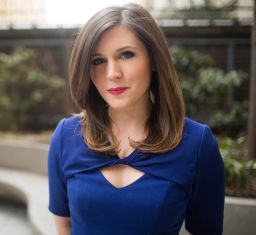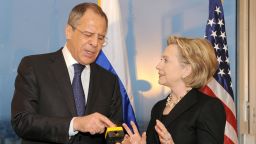Editor’s Note: Jill Filipovic is a journalist based in New York and author of the book “OK Boomer, Let’s Talk: How My Generation Got Left Behind.” Follow her on Twitter. The opinions expressed in this commentary are solely her own. View more opinion articles on CNN.
First things first: Despite Russia’s aggression in Ukraine, and despite Russian posturing about nuclear weapons, it seems wildly unlikely that the current conflict will descend into a nuclear crisis. But that reality doesn’t change the fact that this invasion, and Russian swagger about its nuclear capabilities, ratchets up tensions in an already-deadly situation – and brings a renewed (if still slim) threat of nuclear war to a generation that has never experienced this particular (apocalyptic) fear.

“I would now like to say something very important for those who may be tempted to interfere in these developments from the outside,” Russian President Vladimir Putin said in an address last week about his country’s invasion of Ukraine. “No matter who tries to stand in our way or all the more so create threats for our country and our people, they must know that Russia will respond immediately, and the consequences will be such as you have never seen in your entire history.”
That threat was widely understood to be a nuclear one: That Russia, with its nuclear arsenal capable of killing billions of people, would be willing to go to murderous extremes against any country it believed was interfering with its ambitions in Ukraine.
And that threat is one significant factor why the US and NATO have not intervened. No country, rightly, wants to risk nuclear war.
Making the prospect of nuclear war – even if improbable – a part of the international calculus in potential conflict is still a startling departure, for some from more than 30 years of post-Cold War security.
And for a great many Americans, that’s exactly how long we have been capable of understanding a nuclear threat, period. For members of my generation (I’m a geriatric Millennial) and those younger, the threat of nuclear war was a scary relic of bad times past, and a nuclear attack for many a shameful moment in US history that we only learned about in history books.
I don’t expect that nuclear drills will return to American schools (I’m pretty sure my older fellow Americans already know that desk you were hiding under wasn’t going to save you anyway). But the broad sense of existential dread – and the total lack of control – very well may.
Existential dread, lack of control – these are now familiar anxieties after two years of fearing and doing our best to avoid contracting a new, terrifying and invisible virus. Covid-19 is not a nuke, obviously, but it has wiped out nearly 6 million people worldwide, nearly 1 million of them in the United States. That kind of mass death event would traumatize any country, even if it doesn’t all happen on the same day, and even if the deaths are largely hidden away in hospital beds and not on the streets for the public to witness.
Many of us have, in response, tried to seize control where we can – to lessen our risk and the risk to those around us. We have gotten vaccinated, dutifully donned masks inside, moved social events outdoors.
The psychic toll of all of that fear has lingered, but many Americans are living much freer and more social lives today than they were in late March 2020. We have adapted. True, any sense of control over the disease that we have gained may be tenuous, and it may be exaggerated, but there is at least the statistical promise for most Americans that if you do the right things – get vaccinated, mask up and take even more precautions if you’re elderly or seriously immunocompromised – you are likely to avoid serious illness, hospitalization or death.
No such possibility for individual control exists when it comes to nuclear war; there’s no single individual effort any one of us can make (except for the president) to keep ourselves safe. That’s a difficult thing to wrap one’s head around, and I suspect it’s particularly difficult for many Americans, a notoriously individualistic bunch.
That individualism is part of why we have so struggled to contain Covid, and why our hospitalization and death rates are so high. Too many of us are doing our own “research” rather than listening to the experts. Too many are only thinking of their own health and not the health of their neighbors. We have structured our public health measures so that individual school districts, communities, cities and states are each largely making their own rules, resulting in a chaotic and inconsistent hodgepodge of regulations for a virus that doesn’t respect borders.
How does a country that can’t get it together to fight a transmissible virus get it together to effectively counter nuclear war?
We can hope it doesn’t come to that. But those among us who are beginning to feel the very real fear of this moment should consider what we want to do about it. Unfortunately, this latest conflict may teach world leaders all the wrong lessons about nuclear weapons: that is, that surrendering them as Ukraine did or dismantling a program to build them, as Libya did before its dictator was toppled, makes you vulnerable. And despite this looming (if slim) nuclear threat, there hasn’t been nearly enough talk about nuclear nonproliferation, and how to scale back nuclear arsenals, not have them at the ready.
What is clear is that when it comes to nuclear threats, the person sitting at the desk with the big red button really matters – it makes a difference whether they are a murderous egomaniac like Putin, or a steady and thoughtful hand like Joe Biden. If this crisis subsides – and most of the world seems to be hoping that will happen, and that Ukraine will triumph – I hope we can still remember its lessons. Nuclear weapons keep all of us imperiled, even when we aren’t technically at war. And even more importantly, a presidential election is not a popularity contest or even a forum for the airing of grievances or defeating the other side. It’s a matter of life and death.


